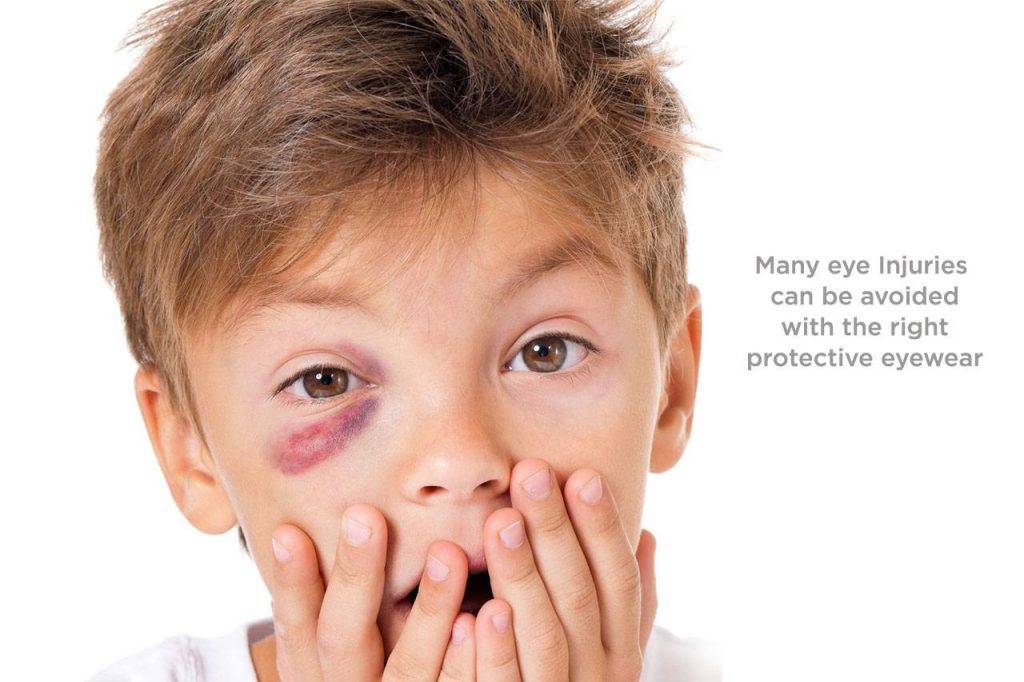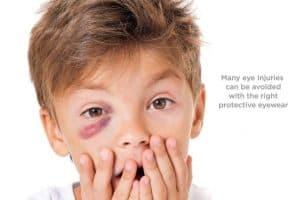What is a black eye?
A black eye is medically termed a periorbital hematoma, or a collection of blood (hematoma) located in the tissues around the eye (periorbital).
A black eye can develop after an injury to the tissues surrounding the eye, and is caused by broken and leaking blood vessels under the skin. A black eye is similar to a bruise you may get after you bang your knee or any other body part— it just looks a bit scarier.
A black eye can affect the entire eye, or be localized to the area just under the eye. The texture of the skin around the eye is both thin and loose, and therefore is quick to bruise and swell, or fill up with fluid when injured— leading to noticeable discoloration. It is often called a “shiner” because the discolored skin around the eye develops a shiny appearance.
What causes a black eye?
Most black eyes are caused by a blunt trauma to the eye, such as a punch, fall, or being slammed in the face with a ball.
However, in some cases a black eye can develop from other causes, including:
- Dental work
- Cosmetic eye surgery
- Sinus infections
- Nasal surgery
- Hidden skull fracture
- Cellulitis (infection around the eye)
Dental work
If you recently had your wisdom teeth removed or underwent dental implant surgery, you may develop one or two black eyes within the coming days. This is due to the fact that the blood and fluid from the surgery can spread underneath your facial tissue, and cause different parts of your face to swell, including the tissue under your eyes.
Hidden skull fracture
If you recently fell or hit your head, a clear sign that you have fractured your skull is the appearance of two black eyes, also referred to as “raccoon eyes”. If you have suffered a skull injury, blood can leak into the soft tissue surrounding the eyes and lead to raccoon eyes.
If you have suffered a head injury, seek immediate medical attention for prompt treatment.
Is a black eye dangerous?
While a black eye can cause significant discomfort, it is generally not dangerous to your health.
However, in some cases, bleeding can occur inside the front of the eye between the back of the cornea and front of the iris. This is called a hyphema, and can cause the pressure within your eye to rise, threatening the development of glaucoma and vision loss.
To avoid complications from a hyphema, seek emergency medical care if you notice any bleeding inside your eye.
Another condition that can occur with a black eye is called a subconjunctival hemorrhage, which causes the eye to appear bright red. While this may appear dangerous, it is not considered a serious condition, and will usually resolve within a few weeks without medical care.
Contact an eye doctor near you to help find the cause and treat your black eye.
SEE RELATED: Eye Injuries: Are All Toys Safe for Children?
Will a black eye heal on its own?
Yes. A black eye will generally heal on its own within a couple of weeks.
However, it is always important to see your eye doctor following an eye injury to make sure that the eye itself was not injured and the pressure within the eye has not increased.
If you experience any of the following symptoms, contact an eye doctor immediately:
- Bleeding inside the eye
- Bleeding from the ears or nose
- Blurry or double vision
- Vision loss
- Seeing flashes or floaters
- Persistent headache
- Dizziness
- Vomiting
- Severe pain
- Loss of consciousness
- Red eye, pus, or excessive swelling
- Inability to move the eye
- Two different pupil shapes
What can I do to help my eye heal?
Reduce swelling
The first thing you want to do is reduce the amount of swelling around your eye. Applying a cold compress to your eye will help to constrict the blood vessels in your delicate skin and limit the amount of swelling.
Contrary to popular belief, or what has been shown on television, putting a piece of frozen raw meat on your eye is not a safe way to reduce swelling. Raw meat contains bacteria and can increase your chances of infection.
Instead, place a bag of frozen peas, corn, or any other frozen product that can mold to the shape of your face, on your swollen eye. Keep the ice pack on your eye for around 15 minutes at a time, every hour, for the next couple of hours.
Caution: Be sure to cover the ice pack with a thin cloth to avoid damaging your delicate skin.
You may also find that chilling a metal spoon in the refrigerator and then placing the back of the spoon on your eye is just as effective as an ice pack.
Pain relief
To alleviate the pain you may be experiencing, take an over-the-counter pain reliever, such as tylenol or ibuprofen.
Avoid taking aspirin because it is a blood thinner and can make your black eye worse.
Massage
Massaging the area around your bruise, not the bruise itself, may help to increase blood flow to the tissue around your eye, and speed up the healing process.
Natural vitamins and enzymes
Studies have shown that consuming certain fruits like pineapple, that contain special enzymes may help to reduce inflammation.
Vitamin C is another natural way to heal your black eye. Vitamin C has been proven to strengthen blood vessels and reduce bruising.
Bilberry extract, a relative of blueberries and cranberries, contains antioxidants that can reduce bruising by enhancing the effects of vitamin C and further strengthen blood vessels.
As your eye heals, you may notice that the discoloration around your eye turns purple, blue, green, or even yellow. This is a sign that your eye is healing.
Be sure to protect your eye from further injury by avoiding hazardous activities during this time.
How to prevent a black eye in the future
To prevent an eye injury that can lead to a black eye, try to protect yourself as much as possible by following these guidelines:
- Wear safety glasses when engaging in hazardous activities such as home repairs or carpentry.
- Wear protective eyewear and headgear when participating in sports activities.
- Keep toys and other objects off the floor and stairs to reduce your risk of falling.
If you have just suffered an eye injury, it is important to contact an eye doctor as soon as possible to ensure that your eye itself was not injured.
LEARN MORE: Guide to Children’s Eye Exams
If you have any questions about treating a black eye, call an eye doctor for professional medical advice. Your ocular health and vision are your eye doctor’s number one priority.


